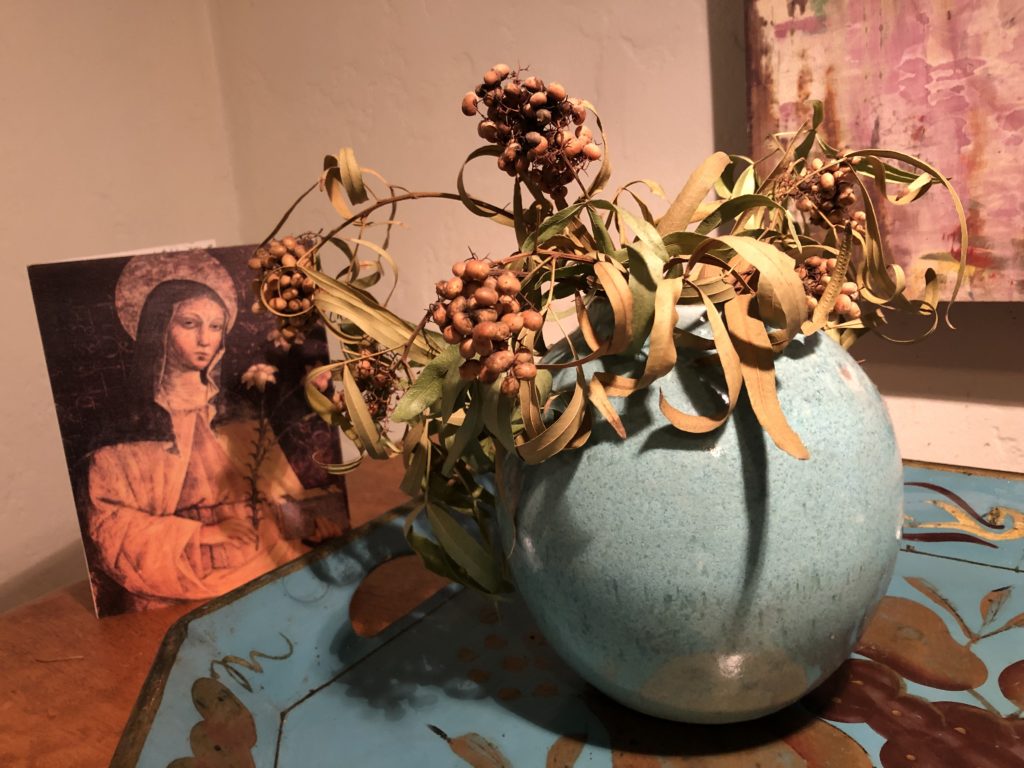David D. Perata first started visiting the Abbey of Our Lady of New Clairvaux Monastery in 1967. Located in the Sacramento Valley town of Vina, at the time 35 monks dwelt among 450 acres of prune and walnut orchards. He found dirt roads, old board and batten guesthouses, and the magical smell of freshly cut alfalfa.
He’d come with his best pal Joe and Joe’s father. The two boys, both from strong Catholic families, “had rarely had a chance to see a priest or a nun in secular clothes, or sipping a beer, or working on a tractor.”
He fell in love with this Trappist monastery, an offshoot of Gethsemani (of Thomas Merton fame) in Kentucky. He came back again and again as he grew into adulthood.
In 1991, he approached then Abbot Thomas Davis to broach the possibility of photographing and interviewing the monks about their lives. Permission was granted — somewhat miraculously as, per the Rule of St. Benedict, the monks fiercely guard their privacy). Perata wrote a series of articles, but the oral histories lay dormant for seven years.
Finally, again with permission, he transcribed the histories and, along with a series of black-and-white photographs showing the monks at work and prayer, collected them into a book titled “The Orchards of Perseverance” (St. Therese’s Press, $19.59).
Many of the monks had entered during the ’50s and ’60s. At least one had already died by the time the book was published.
I came across the volume soon after coming into the Church in the mid-90s, and have come back to it many times since.
“What I found while researching the history of Cistercian monasticism was an incredible description of the mystical relationship between God and the human soul,” notes Perata, “and how a monk strives to perfect this relationship through his monastic vocation.”
The monks are pictured making bread, sorting walnuts, painting a shed, fixing a motor. The individual stories, the mystery of a divine call, the almost universal monastic experience of highs, lows, dark nights of the soul, and the arrival at last of some kind of underlying peace — in spite of ongoing surface tensions and anxieties — make for compelling reading.
In the silence and solitude, stripped of their previous lives, many of the men underwent a kind of disintegration of personality. The realization that they weren’t who they thought they were could be profoundly unsettling.
Brother Adam — baker, tailor, shoemaker — had learned after 50 years of monastic life that the focus had to be on community. “If you don’t play your little part you’re affectin’ the whole team. … You have to have a real drive and incentive to become a success, just as you are in the world. A spiritual millionaire, if you wanna think of it that way.”
Father Timothy had lived in a simple hermitage shack at New Clairvaux since 1958. “My experience at the end of all these years is that in Christ I experience God as my own dear Father. … There’s a contentment, a happiness, a fulfillment; gratitude, love, joy you want to share with everybody in the whole world, and that’s what I do in the shack.”
But there’s one monk who struck a special place in my psyche: Father Anthony, who entered New Clairvaux in 1972.
Born and raised Catholic, initially he had no desire to be a priest. He earned a business and engineering degree and became a corporate sales engineer. But after his plans for marriage and children fell through, he joined the Dominicans in San Francisco and began studying to be a priest at St. Albert’s College in Oakland. Six months in, he had a complete mental breakdown.
He’d been assigned to sweep the pavement outside the novitiate. They’d given him a little three-foot push broom and right away, he saw he could get the job done faster if he put two brooms together. So he was sweeping away and the novice master came along and said, “No, no, no, don’t do that, just use one broom.”
And Anthony suffered an utter collapse, interior and exterior. He went to sleep and didn’t wake up for two weeks. He saw a psychiatrist for five years. All his life, he’d been a producer. They’d taken away his ability to produce, and he no longer knew who he was.
Many times over the years I’ve revisited Anthony’s story with a sense of profound schadenfreude. Who would I be if “they” took away my phone, my laptop, my writing pad, my to-do lists, my Post-Its, my appointment book, my calendar, my stacks of books, my saved files, my pen? My pride in the ability to move quickly, to multitask, to give a “good account” of myself at the end of the day?
Anthony ended up leaving the Dominicans, joining the Trappists, and becoming a priest and a potter. He started out making ceramic chalices and branched out to pitchers, mugs, vases. He died in 2018.
Recently, on a whim, I googled his name and found a number of his vases on eBay. One, Madonna-blue and beautifully rounded, now sits by my bedside.
Be a spiritual millionaire, it whispers. Use the one small broom.

